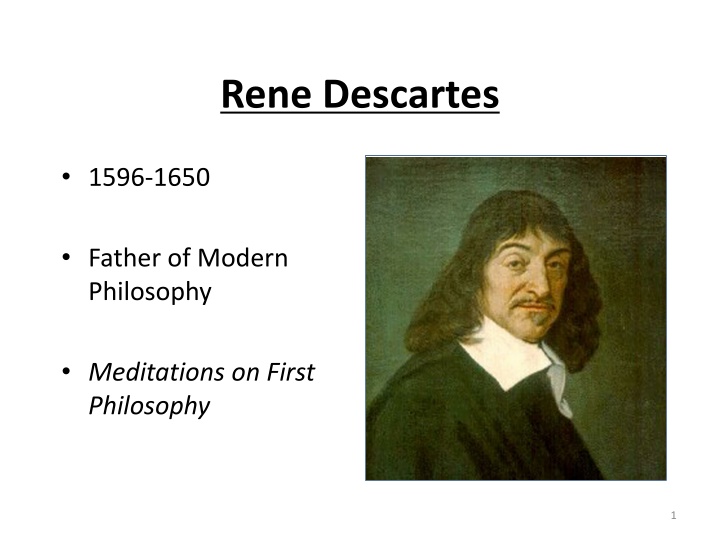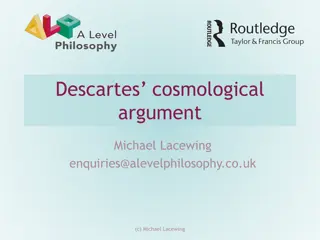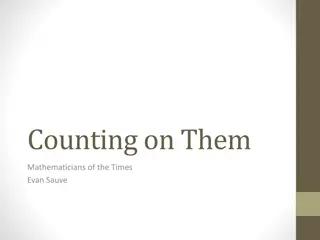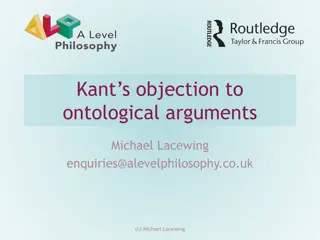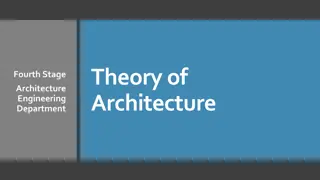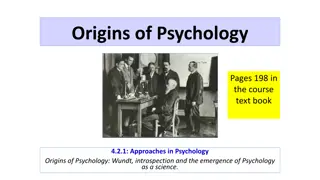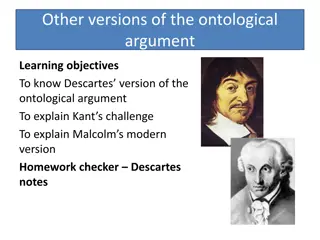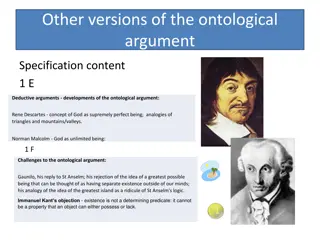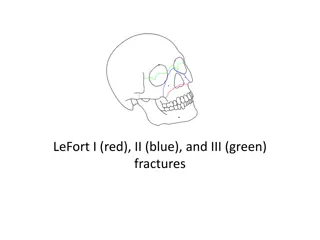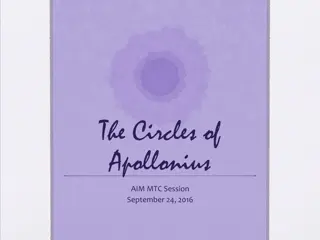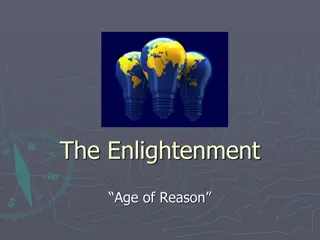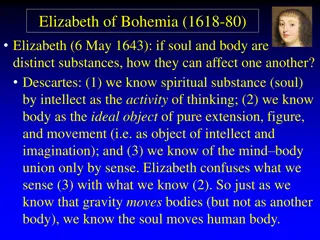Rene Descartes
Rene Descartes, known as the Father of Modern Philosophy, introduced Cartesian Dualism, a metaphysical view stating reality consists of two fundamentally different entities - the material body (extended substance) and the immaterial mind (unextended substance). He famously stated "I think; therefore, I am," emphasizing the distinction between the thinking mind and the physical body. Descartes argued for the existence of two universal substances - the mind (mental/soul) and the physical body. Dualism is a prominent concept in philosophy and religion, with arguments supporting the belief in a non-material soul that transcends physical limitations.
Download Presentation

Please find below an Image/Link to download the presentation.
The content on the website is provided AS IS for your information and personal use only. It may not be sold, licensed, or shared on other websites without obtaining consent from the author.If you encounter any issues during the download, it is possible that the publisher has removed the file from their server.
You are allowed to download the files provided on this website for personal or commercial use, subject to the condition that they are used lawfully. All files are the property of their respective owners.
The content on the website is provided AS IS for your information and personal use only. It may not be sold, licensed, or shared on other websites without obtaining consent from the author.
E N D
Presentation Transcript
Rene Descartes 1596-1650 Father of Modern Philosophy Meditations on First Philosophy 1
DUALISM Metaphysically, the view that reality consists ultimately of two fundamentally different entities. 2
Cartesian Dualism Material Body Extended substance in space Immaterial Mind Unextended substance that thinks 3
Descartes Two Universal Substances Mind Physical (Mental/Soul) 4
I think; therefore, I am. This I that is, the soul, by which I am what I am, is entirely distinct from the body; and would not fail to be what it is even if the body did not exist. 5
I think; therefore, I am. He equated the soul with the thinking mind. It is the continuity of the thinking mind or soul that makes a person endure as the same person over time. 6
So Essential property of body is that it is extended. (Geometric qualities: size, shape, etc.) Essential property of mind is that it thinks. 7
Isnt Dualism Obvious? Most people accept dualism as the answer to the mind-body problem. 8
Arguments for Dualism Don t the major world religions posit a non-material soul that survives the physical demise of the body? 9
Christianity: Matthew 10:28 Do not be afraid of those who kill the body but cannot kill the soul. 10
Arguments for Dualism With our mind we feel hope, fear, love, hate, disgust, shame, pride, and amusement (consciousness). For our bodies, we diet, lift weight, and adorn them with jewelry and make-up. 11
Arguments for Dualism When our bodies weaken, don t our minds still stay strong? E.g., Stephen Hawking (Amyotrophic Lateral Sclerosis) 12
Arguments for Dualism And can t the mind deteriorate while the body remains vigorous? E.g., Alzheimer s 13
Arguments for Dualism Don t these differences imply that the mind and body are distinct entities? 14
Modern Western Viewpoint We as humans consist of two entities. Our physical selves and our mind/souls/consciousness. We are composed of material and immaterial stuff. And these two interact .. 15
THE MIND-BODY PROBLEM 16
Interactionism 1. You hit your thumb with a hammer. Physical event 2. Which Causes Pain. Mental event 3. You Scream! Physical event 17
Problem How can something material affect anything that immaterial? Or Vice-Versa How can anything immaterial affect anything that is material? 18
Example Most people regard with suspicion a claim that a nonphysical mind has moved some dice or a table. They should regard with equal suspicion a claim that a nonphysical mind has moved an arm or a toe. 19
Problems of Dualism (1) How can something like the mind reach into the physical world and affect it? If it did so, then the mind would somehow have to introduce new energy and force into the physical world. 20
Problems of Dualism (2) Dualism cannot account for why mental functioning is substandard when the physical brain is damaged. 21
Problems of Dualism For if it is the non-physical soul that thinks, why can t it think just as well in a damaged brain as in an undamaged brain? After all, the soul is supposed to be able to think without any brain at all. 22
Problems of Dualism (3)Dualism cannot account for why mental functioning develops *ontogenetically right along with the physical development of the brain and nervous system. *based on morphological characteristics 23
Problems of Dualism There are degrees of mental development, and they appear to correlate with degrees of physical brain development. Fetuses, babies, toddlers, adults 24
Problems of Dualism (4)Dualism cannot explain why mental capacities apparently developed *phylogenetically in tandem with brain development. *Evolutionary history of an organism. Based on natural evolutionary relationships. 25
Problems of Dualism That is, dualism cannot account for why the best-thinking souls have always inhabited the most highly evolved brains. Neanderthals, homo erectus, homo sapiens sapiens 26
Problems of Dualism (5) Dualism cannot account for why we can sometimes change our mental functioning by altering our brain chemistry. E.g., Prozac or Zoloft alleviates depression by inhibiting the brain s reuptake of the neurotransmitter serotonin. (End) 27
